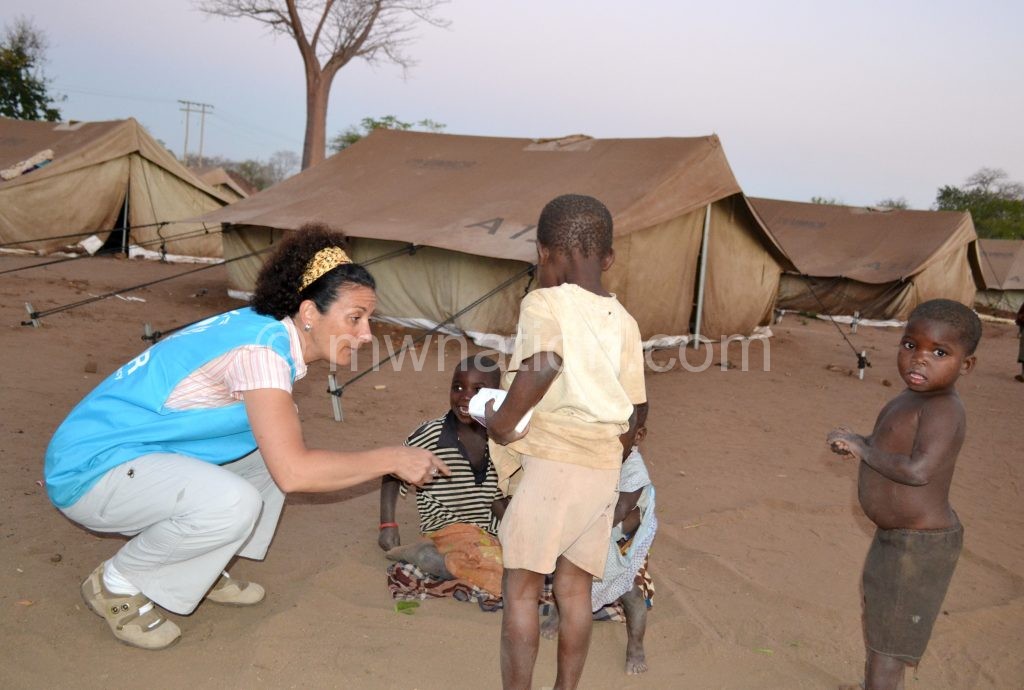Enjoying safety in foreign land
In four months time, 30-year-old Nasimango Lackson and her four children will have been without a home for a year.
She is among thousands of Mozambicans seeking shelter in Malawi having fled conflicts and persecution back home.

The people are fleeing deadly skirmishes between government soldiers and opposition Mozambique National Resistance Movement (Renamo) militia who want to forcibly take control of six mineral-rich provinces of Tete, Manica, Sofala, Zambezia, Nampula and Niassa.
For Lackson, before embarking on the perilous journey to Kapise in Mwanza District, she never thought she would one day call herself Malawian.
But after a transition which she says has not been free of stress since she left her home at Ndande in Moatize District, she seems to have changed that thought. She vows never to go back to Mozambique “because Malawi is now my home”.
The woman, currently five months pregnant, is among more than 1 432 Mozambican refugees currently staying at Luwani Refugee Camp in Neno District, after being relocated from Kapise.
Luwani Camp hosted more than one million Mozambican refugees who fled that country’s 16-year civil war that ended in 1992, but government closed it in 2007.
“I have already suffered enough and I see no reason why I should return. We separated from our relations and lost everything in the process. So, I have no home in Mozambique.
“We walked for days to get here. We have lived miserably, but the peaceful life is important for my children,” recounts Lackson, whose husband deserted her from the camp three months ago.
She is not the only one making such a declaration. Yunike Kam’mphepete, 35, who herself fled from Zobue, is another one declaring to be Malawian. She says the “generosity of indigenous Malawians” is key in her decision.
“We have been here for months now living freely and with pleasure. We are now Malawians and we urge the government and communities here to recognise us as such. Of course, we cannot overlook the food challenges, but we appreciate it is a national crisis,” she says.
Luwani Camp has nine “villages” named after different African countries, including Tanzania, South Africa, Botswana, Zimbabwe, Zambia, Nigeria, Swaziland, Kenya and Ghana.
The refugees say they gave their “villages” names of African countries as a way of ensuring their contact with the continent and Lackson and Kam’mphepete—a mother of five—are “Botswana Village” residents.
United Nations High Commission for Refugees (UNHCR) senior emergency coordinator Fadela Novak-Irons says arrangements are still in progress to prepare the refugees to live normal lives.
Besides UNHCR, there are about 20 other partners in the response work at Kapise and Luwani.
The partners work in close cooperation with the Ministry of Home Affairs and Internal Security and other line ministries.
Currently, refugees at Luwani are living in transitional shelters made with plastic sheeting that will soon be upgraded to semi-permanent shelters constructed from bricks for them to have improved living conditions.
Further, the camp has 14 new and rehabilitated boreholes, electricity and a health facility fully stocked with essential drugs.
“The work is ongoing, but I would say so far we have achieved significantly to provide good ground for the refugees to rebuild their lives that had been shattered by the flights,” says Novak-Irons.
However, a lot more still needs to be done in terms of food and education to children who are currently studying in tents.
Although the number of new entrants to Kapise Refugee Transit Centre has declined, the ongoing volatile situation in Mozambique—particularly Tete Province where the people are fleeing from—means the situation may change for the worse any time.
A few months ago, at the surge of the conflict, the number of refugees being hosted at the overcrowded Kapise reached 13 000. However, as at the end of May, the number of refugees at both Luwani and Kapise was slightly over 8 500.
Nevertheless, resources continue to be stretched.
Yesterday, Malawi joined the rest of the world in commemorating the World Refugee Day under the theme Together for Peace, Tolerance and Prosperity. Main events took place at Luwani and Dzaleka Refugee Camp in Dowa.
Since 2001, the United Nations (UN) has been observing the day annually to raise awareness of refugees’ situation throughout the world, but this year, UNHCR has started the #WithRefugees petition to send a message of action, solidarity and responsibility to governments worldwide on behalf of refugees.
According to UNHCR, there are about 59.5 million forcibly displaced people around the world. Nearly 20 million of the 59.5 million are refugees with an average of 42 500 becoming internally displaced in their own countries daily.





